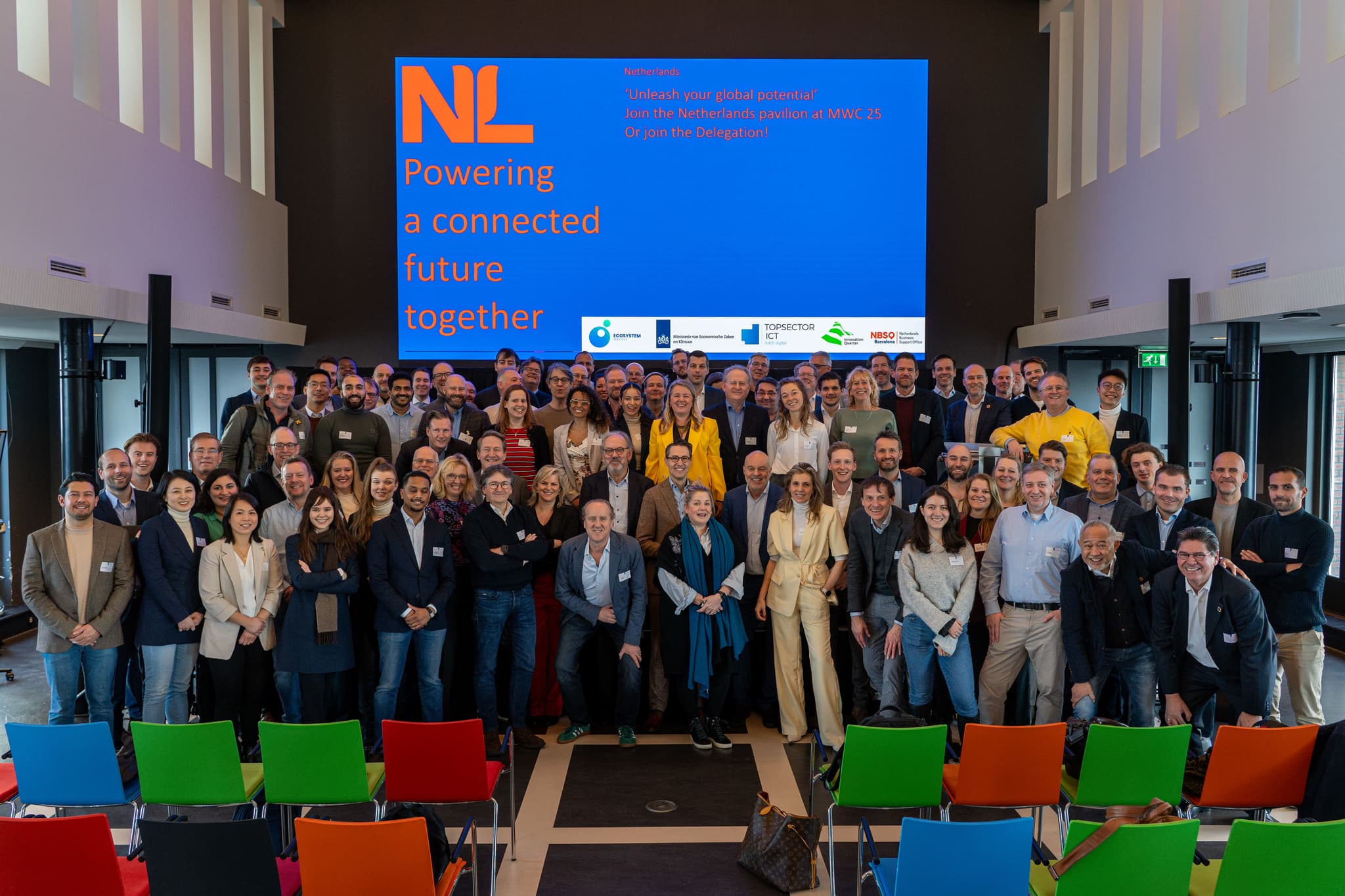The Netherlands proves: we are well ahead in mobile revolution
The Netherlands is showing its leading role in the world of mobile networks at the largest mobile congress, MWC 2025.
Published on February 10, 2025

Our DATA+ expert and Editor-in-Chief, Elcke Vels, explores AI, cyber security, and Dutch innovation. Her "What if..." column imagines bold scenarios beyond the norm.
Geopolitical tensions and the emergence of a cheap Chinese ChatGPT alternative make one thing clear: digital autonomy is essential for Europe's future. The Netherlands can contribute significantly to this, as our delegation will show next month at the Mobile World Congress (MWC 2025) in Barcelona. From the development of 6G to smart applications of mobile networks in healthcare and aviation: it is all happening on Dutch soil.
With more than 100,000 visitors expected, Mobile World Congress is the world's largest exhibition for the cell phone industry. The congress has been held annually since 1987. The Netherlands will have a physical home base again this year. For the ninth time, Ecosystem Services together with the Ministry of Economic Affairs (EZ) and Top Sector ICT is delivering a Dutch delegation: NL MWC 2025.
Last week, the parties involved gathered at the kick-off event at the Ministry of EZ in The Hague. The room was packed with enthusiasts, mostly active in the digital world. Jos de Groot, deputy director of economics and digitization at the ministry, kicked off. “Digitalization is one of the most important transitions at the moment. The world is changing rapidly, with the emergence of technologies such as ChatGPT. Moreover, we are in the midst of geopolitical tensions between China, the U.S. and Europe.” De Groot emphasized that promoting digital innovation is at the top of the minister's agenda.

The Netherlands: top position in world of mobile networks
Digital innovation is taking place in abundance in the Netherlands. In doing so, the country is contributing to Europe's pursuit of a key position in the mobile sector. Organizers Mark Beermann and Anke Kuipers of Ecosystem Services are pleased with the Dutch delegation leaving for Barcelona next month. “The Netherlands has one of the best mobile networks in the world. Not only that: smart applications are in full swing here. We have strong Dutch representation in Barcelona,” Beermann said. Kuipers adds: “AI, gaming, sustainability, logistics and the development from 2G to 6G: we will show in Barcelona what we have to offer.”
Dutch scaleups and startups with groundbreaking innovations
In addition to promising scaleups such as Axelera AI and Qbird, 16 Dutch startups will enter the show floor next month, including AntenneX. The company focuses on advanced antenna technologies for improved network speed. Space4Good is working on satellite technologies for monitoring environmental issues. Aircision is developing high-speed wireless communications solutions that enable 6G.
Developments around 6G
6G is the sixth generation of wireless networks, successor to 5G. It offers faster speeds and greater capacity for smartphones and other wireless devices. 6G is one of the main themes in the digital world this year anyway, as it will dramatically change the way we connect and experience technology. This mobile technology is expected to make its appearance in 2030. The government has committed €203 million to the development of 6G.
The speech by Peter Kortenhoeven, ceo of PWXR who is also accompanying us to Barcelona, once again emphasized the potential of 6G. Kortenhoeven and his team are trying to get people off the couch and get them moving in an active and fun way, with the whole body acting as a controller. However, that requires a fast and responsive connection to make the experience optimal. Ultimately, PWXR wants to not only conquer the gaming world, but also start developing therapies and training.
Europe bets on digital autonomy
The developments in the Netherlands are promising, but they are not necessarily representative of Europe's position on the world stage, as the presentation by Paul Timmers showed. He is a professor at KU Leuven and former director at the European Commission, where he was responsible for legislation and funding programs in the areas of cybersecurity, e-ID and other topics surrounding digitization. Timmers began with a critical note: Europe is severely underrepresented in a variety of sectors. When it comes to the extraction of scarce earth metals, the automotive industry, but certainly also on the digital front. “From AI to cloud solutions: China and the US are doing much better.”
According to the professor, it is therefore high time to invest heavily in digital autonomy. In recent years, the EU has already developed important policies that help with this, such as the AI Act and the Digital Markets Act. “These are aimed at strengthening the strategic economy.” Europe is also increasingly working with strategic partners. “Think of countries like Japan and South Korea.”
Finally, Timmers discussed the opportunities for the EU in terms of digital autonomy, in response to a question he received from the audience. While the EU is not a leader in many sectors, it does have potential in specific areas, “such as AI, emerging technologies and quantum,” he concluded.
The Dutch pavilion can be found March 3 to 6 at the Mobile World Congress in Barcelona, between Hall 4 and Hall 5, Stand CS54.
